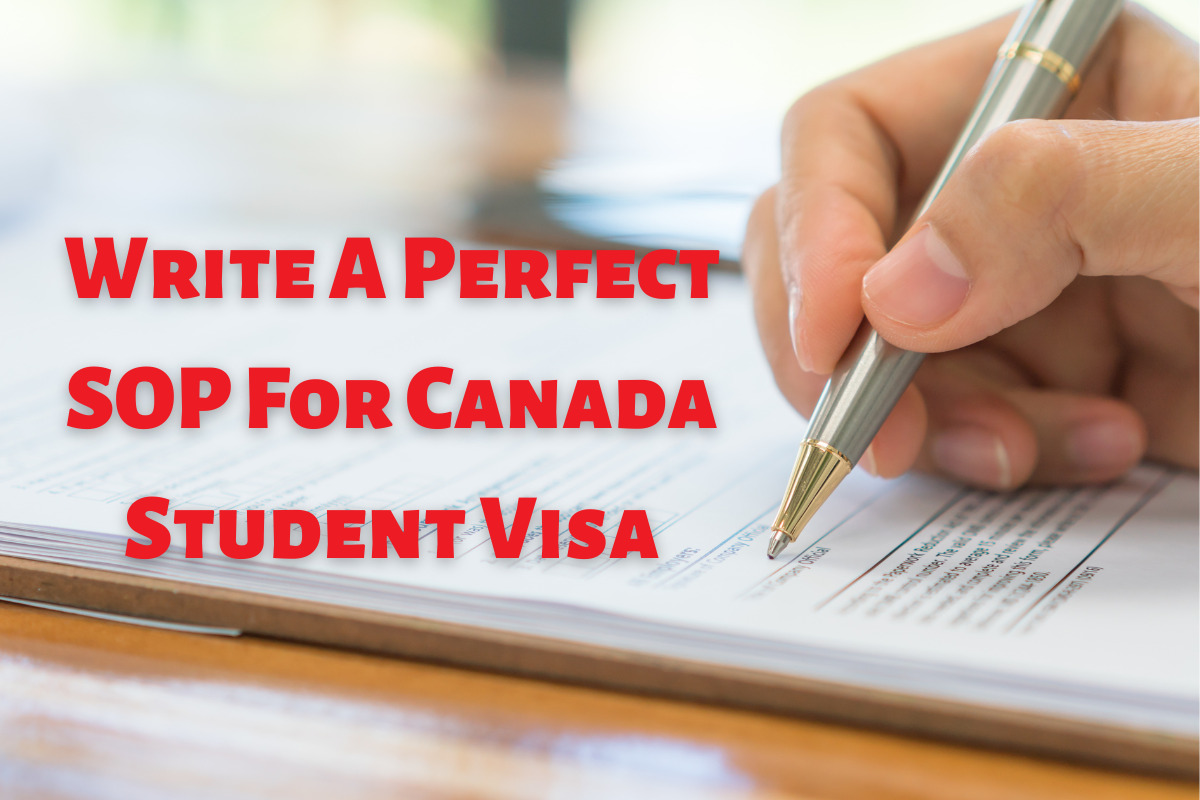How To Write A Perfect SOP For Canada Student Visa?
What is a ‘Statement of Purpose’ or SOP?
A Statement of Purpose (SOP) is a document that outlines an individual’s academic and professional goals, as well as their reasons for pursuing a particular course of study or career. It is usually required as part of the application process for graduate school, business school, law school, medical school, and other similar programs.
An SOP is typically a one-to-two-page essay that provides a comprehensive overview of the applicant’s background, qualifications, and interests. It should also explain why the applicant is interested in pursuing the program or course of study, how it will help them achieve their career goals, and what unique skills and experiences they will bring to the program.
Overall, the statement of purpose should present a clear and convincing argument for why the applicant is a good fit for the program and how their academic and professional background prepares them for success in the field.
What is the Importance of an SOP?
A Statement of Purpose (SOP) is an important document for several reasons:
- Helps Admissions Committees Evaluate Applicants: SOPs are used by admissions committees to evaluate applicants based on their academic background, career goals, and motivation for pursuing the program. A well-written SOP can give the committee a clear idea of who the applicant is, what their strengths and weaknesses are, and how they are a good fit for the program.
- Demonstrates Applicant’s Communication Skills: The SOP is also an opportunity for the applicant to demonstrate their writing skills and ability to communicate their ideas clearly and concisely. Admissions committees look for applicants who can effectively express their thoughts and ideas in writing, as this is an important skill in many fields.
- Highlights Unique Qualifications: An SOP can help applicants stand out by highlighting their unique qualifications, experiences, and perspectives. This can be particularly important in highly competitive programs where the admissions committee receives a large number of applications.
- Sets Expectations and Goals: An SOP can help the applicant set expectations and goals for their academic and professional future. By outlining their career goals and motivations for pursuing the program, the applicant can demonstrate their commitment to the field and the specific program.
Overall, a well-written SOP can be a critical factor in the admissions process and can help applicants stand out in a competitive applicant pool. It is important to take the time to carefully craft an SOP that effectively communicates your qualifications and motivations for pursuing the program.
Basic Structure followed in an SOP
The structure of an SOP can vary depending on the program or institution’s requirements, but generally, it follows the following basic structure:
- Introduction: Begin with an attention-grabbing opening sentence that highlights your interest in the program. Introduce yourself and provide some background information about your education and work experience.
- Academic Background: Discuss your academic background, including any relevant coursework, research, or projects. Explain how your academic background has prepared you for the program and why you are interested in pursuing it.
- Professional Experience: Describe your relevant work experience, including any internships or volunteer work. Explain how your professional experience has prepared you for the program and how it aligns with your career goals.
- Motivation for Pursuing the Program: Explain why you are interested in pursuing the program and how it aligns with your career goals. Discuss any specific areas of interest within the program and why they are important to you.
- Unique Qualifications: Highlight any unique qualifications, skills, or experiences that set you apart from other applicants. Explain how these qualifications will contribute to your success in the program and the field.
- Conclusion: Summarize your main points and reiterate your interest in the program. End with a strong closing statement that leaves a lasting impression on the reader.
Remember to proofread and edit your SOP carefully to ensure that it is well-written, concise, and error-free. A clear and well-structured SOP can help you stand out from other applicants and increase your chances of being accepted into the program.
Sample Statement of Purpose (SOP) for Canada
Here is a sample Statement of Purpose (SOP) for Canada:
Dear Admissions Committee,
I am excited to apply to [Name of University] to pursue a Master’s degree in [Name of Program]. My passion for [field of study] started during my undergraduate studies, where I was drawn to [specific aspect of the field]. Through my academic and research experience, I have developed a deep interest in [specific research topic or area of specialization].
I completed my Bachelor’s degree in [Field of study] from [Name of University] with a strong academic record. During my undergraduate studies, I took several courses in [related fields] and participated in [name of research project or internship] to gain practical experience. This experience allowed me to develop strong critical thinking and analytical skills that will be valuable in pursuing advanced research in [field of study].
After completing my undergraduate studies, I worked as a [name of position] at [name of organization] for [duration]. During this time, I was responsible for [list of responsibilities]. My experience in this role gave me a strong foundation in [specific skill or aspect of the field], which will be invaluable in my future academic and professional pursuits.
My ultimate goal is to pursue a career in [specific field or role] and contribute to the advancement of [specific aspect of the field]. I believe that pursuing a Master’s degree in [Name of Program] at [Name of University] will provide me with the knowledge, skills, and experience necessary to achieve my career goals. The program’s focus on [specific area of the field] and the opportunity to work with leading researchers in the field make it an ideal fit for my academic and professional aspirations.
In conclusion, I am confident that my academic and professional background, along with my passion for [field of study], make me an ideal candidate for the Master’s program in [Name of Program] at [Name of University]. Thank you for considering my application, and I look forward to the opportunity to contribute to the academic community at [Name of University].
Sincerely, [Your Name]
6 Common mistakes students can avoid while preparing an SOP
Here are six common mistakes that students can avoid while preparing an SOP:
- Lack of clarity and focus: One of the most common mistakes in an SOP is a lack of clarity and focus. The SOP should have a clear and focused message that highlights the applicant’s academic and professional background, goals, and motivation for pursuing the program. Avoid using vague or generic language and ensure that the SOP is tailored to the specific program or institution.
- Poor organization and structure: A poorly organized and structured SOP can make it difficult for the reader to follow the applicant’s ideas and arguments. Be sure to use a clear and logical structure that includes an introduction, body, and conclusion. Use headings and subheadings to break up the text and make it easier to read.
- Grammatical and spelling errors: Grammatical and spelling errors can make an SOP appear unprofessional and reduce the credibility of the applicant. Be sure to proofread and edit the SOP carefully to eliminate errors. Consider asking someone else to review the SOP to catch any mistakes that you may have missed.
- Excessive use of jargon and technical language: While it is important to demonstrate your knowledge and expertise in the field, excessive use of jargon and technical language can make an SOP difficult to read and understand. Use clear and concise language that is accessible to a broad audience.
- Lack of originality: Admissions committees read a large number of SOPs, and a lack of originality can make an applicant’s SOP appear generic and unremarkable. Be sure to highlight your unique qualifications, experiences, and perspectives in the SOP. Avoid using clichés and generic statements.
- Inappropriate tone: The tone of an SOP should be professional and formal. Avoid using an overly casual or informal tone that can make the SOP appear unprofessional. At the same time, avoid using an overly formal or stilted tone that can make the SOP appear rigid and impersonal. Strive for a tone that is confident, authentic, and professional.
6 Tips to Write the Perfect SOP for Canada Study Visa
Here are six tips for writing the perfect SOP for a Canada Study Visa:
- Research the program and institution: Before writing the SOP, research the program and institution to understand its values, mission, and academic offerings. This will allow you to tailor your SOP to the specific program and institution and demonstrate your knowledge and interest in the field.
- Focus on your academic background and achievements: The SOP should highlight your academic background and achievements, including your grades, coursework, research projects, and academic awards. Be sure to explain how your academic background has prepared you for the program you are applying to.
- Explain your motivation for pursuing the program: The SOP should explain why you are interested in pursuing the program and how it fits into your academic and career goals. Be specific about the skills, knowledge, and experience that you hope to gain from the program.
- Highlight your extracurricular activities and experiences: In addition to your academic background, the SOP should also highlight your extracurricular activities and experiences. This can include internships, volunteer work, leadership positions, and other activities that demonstrate your skills and interests.
- Use clear and concise language: The SOP should use clear and concise language that is easy to understand. Avoid using jargon, technical language, or overly complex sentences. The goal is to communicate your ideas in a clear and accessible way.
- Proofread and edit carefully: The SOP should be proofread and edited carefully to eliminate errors and ensure that the language and structure are clear and effective. Consider asking a friend, family member, or teacher to review the SOP and provide feedback. The goal is to present a polished and professional document that reflects your academic and personal strengths.
Conclusion
In conclusion, a Statement of Purpose (SOP) is an important document that allows students to showcase their academic and personal qualifications, achievements, and motivation for pursuing a particular program or institution. By avoiding common mistakes such as lack of focus, poor organization, grammatical errors, excessive use of jargon, lack of originality, and inappropriate tone, students can create a compelling and effective SOP that highlights their strengths and distinguishes them from other applicants. By following the basic structure of an introduction, body, and conclusion, and tailoring the SOP to the specific program and institution, students can increase their chances of being accepted into their desired program or institution.




